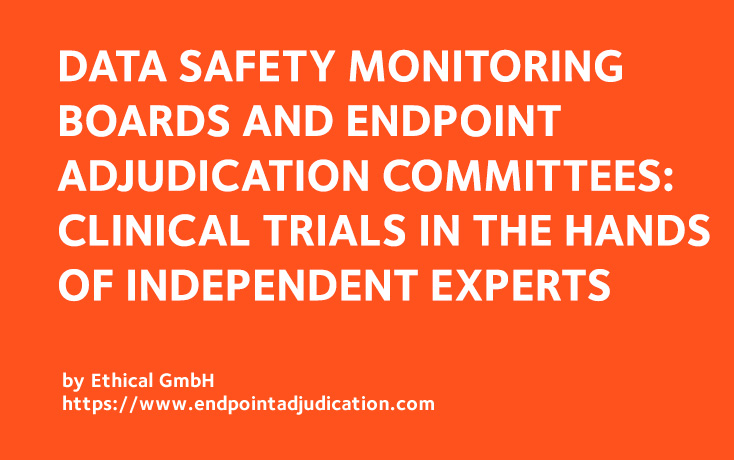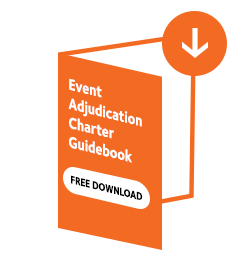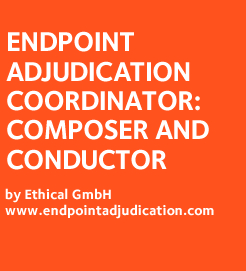Good Clinical Practice (GCP) have governed clinical trials for more than fifty years, ensuring research quality and patient protection. In the last decades, a new trend has emerged pushing pharmaceutical companies to invite external experts to review clinical data and monitor safety. The use of Data Safety Monitoring Boards (DSMB) has become an obligation and more recently yet another trend has emerged: the use of Endpoint Adjudication Committees (EAC). A Data Safety Monitoring Board supports the sponsor to ensure independent review of safety data while an EAC supports the principal investigators (PI) to guarantee unbiased assessment of both efficacy and safety endpoints. With the help of enabling digital technologies that make data exchange easy and secure, clinical trials are gradually moving into the hands of independent experts.
The birth of good practices in clinical research
In the post-world-war-2 euphoria and rapid development era, new trends emerged in the field of pharmaceutical development and healthcare. On the one hand, the world witnessed important advances in surgery due to the development of new war trauma surgical practices as well as major innovations in pharmacology, the discovery of penicillin being the most prominent. On the other hand, the uncover of abominable “medical” practices in the death camps left the world in shock and alerted humanity to the need for protection of subjects participating in medical experiments. The Declaration of Helsinki, a set of ethical principles for human experimentation developed by the World Medical Association (WMA), was signed in 1964 and is widely regarded as the cornerstone document on human research ethics.
Meanwhile, the tragedy of thalidomide marketed in the late 1950s and early 1960s as a safe over-the-counter non-barbiturate sedative gave the world a painful wake-up call on drug safety. While the US FDA refused to approve the drug arguing that the safety and efficacy data were incomplete, the drug was already in use in 46 other countries. Teratogenic effects soon started appearing and the drug was withdrawn from the market, leaving behind thousands of “thalidomide children” with major malformations. The first committee to study the principles of biomedical research was convened by WHO in 1968, and finally in 1975 the International Council on Harmonization of Technical Requirements for Registration of Pharmaceuticals for Human Use, better known as ICH, took a deep dive in all aspects of the assessment and evaluation of new medicines and gave birth to the first version of Good Clinical Practices (GCP) which have since then become a prerequisite for marketing authorization worldwide.
In the framework of strict GCP enforcement, the protocols, statistical methodology and descriptive narrative of safety related events are scrutinized in clinical trials by Ethics Committees (EC), Institutional Review Boards (IRB) and Data Safety Monitoring Boards.
Beyond GCPs: Independent Committees
Nevertheless, infrequent though important effects can escape detection via the standard methodology and cause harm that appears only when usage becomes widespread as in the case of Vioxx (rofecoxib) in the early 2000’ that was shown to cause cardiovascular effects long after market approval. The systematic use of independent Data Safety Monitoring Boards with the power to stop a study or request additional analyses has since helped improve the accuracy of safety profile determination for new drugs.
In parallel, as clinical trials become increasingly complex and the volume of data collected explodes, accurate assessment of patients in clinical trials at the investigational site has drawn attention from sponsors and regulators. Clinical endpoints can sometimes be complex and based on a variety of data that can be interpreted in different manners by each principal investigator (PI). Sponsors have therefore turned to independent Endpoint Adjudication Committees to review those complex clinical endpoints to help reduce bias. Modern digital technologies make the transfer of information, blinding and assessment process easy and have opened the way for this new practice that further enhances the quality and accuracy of clinical trials.
Entrusting both the review of centralized clinical research data and the assessment of endpoints to independent committees such as Data Safety Monitoring Boards and Endpoint Adjudication Committees that have no financial links to the drug or the study moves important responsibilities in the conduct of clinical trials from the sponsor into the hands of independent experts.
Towards more objectivity
Today new trends have emerged towards more objectivity in new drug assessment. Many sponsors make raw data of late stage clinical trials publically available and invite independent parties such as patient associations to repeat the analysis or conduct their own in an effort to render clinical trials as transparent as possible. A new identification coding system (IDMP) was also developed to allow easier and better tracking of all the components of a new drug, from base ingredients to regional packaging, greatly improving the safety signal detection power of pharmacovigilance methodologies.
In conclusion, independent committees combined with public sharing of investigational data gradually takes the assessment of clinical trials out of sponsors’ hands into those of parties that have no financial ties to the commercial products and are therefore likely to be more objective.
Data Safety Monitoring Board and Endpoint Adjudication Committee
Data Safety Monitoring Boards and Endpoint Adjudication Committees are composed of people who are not directly involved in the conduct of the study and have no financial links to the study.A Data Safety Monitoring Board typically includes an ethicist, statistician and medical personnel who specialize in the disease being studied and have in depth knowledge of possible adverse events related to the experimental drug. Many Data Safety Monitoring Boards today also include a community or patient advocate.
An Endpoint Adjudication Committee typically includes three experts (two ‘reviewers’ and one ‘chair’ or ‘tiebreaker’) who provide an independent blinded review of complex clinical endpoints on an ongoing basis to help reduce bias in clinical trials. Contrary to the Data Safety Monitoring Board that focuses on safety data review and analysis, the Endpoint Adjudication Committee receives additional information, documents, images and data directly from the investigational sites and provides unbiased assessment of both efficacy and safety endpoints.
DOWNLOAD NOW THE FREE ENDPOINT ADJUDICATION HANDBOOK
The Complete Manual / Reference Book (34 pages) with all the topics related to the Independent Endpoint Adjudication Committees Management








